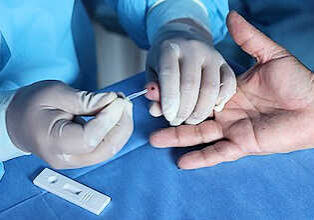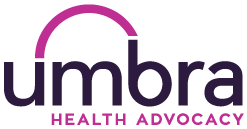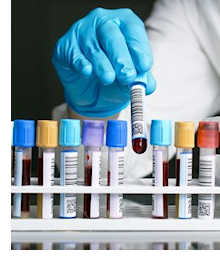What You Need To Know About Covid-19 Testing

This article about Covid-19 testing was originally written by advocate and guest blogger, Angie Galatas of Medical Advocacy Plus, LLC. Edited by Audrey Zhang.
Antigen, antibody, viral, serology. What do these intimidating words even mean? The Covid-19 pandemic has exposed us to all sorts of new medical terminology. We've all had to try to decode all the information available out there.
Many of us have already had Covid-19, maybe even more than once. And probably everyone is ready for this pandemic to be over! But new Covid-19 variants keep emerging. And infection spikes come in waves. As a result, Covid-19 testing will probably be part of our lives for a long time.
Testing is an important way to protect yourself and slow the spread of Covid-19. Let's simplify information about Covid-19 testing and ease some of the confusion.
Rapid vs. Laboratory Covid-19 Tests
There are two main ways to test for Covid-19: with a rapid test or a lab test.
- Rapid Tests: Rapid tests can be done quickly at home. They take 15 or 30 minutes with a nasal swab. However, the results may be less reliable, especially for people without symptoms. The CDC recommends that you follow up with a laboratory test if you think you might be infected. On the other hand, if you test positive in a rapid test, you can be certain that you are currently infectious.
- Laboratory Tests: Results from laboratory tests — most commonly PCR — can take one to three days. These tests are a lot more reliable than rapid tests because they can detect very small amounts of the virus. Even though these tests are more accurate than rapid tests, it's still possible to test negative on a lab test even if you're positive. Because lab tests are so sensitive, you could also test positive from a past infection. The PCR could continue to detect fragments of the virus even after you’ve recovered from Covid-19 and are no longer contagious.
Viral vs. Antigen Covid-19 Tests
Covid-19 tests look for either viral infections or antibodies. Viral tests are best to find out if you are currently infected and contagious with Covid-19. Antigen tests can tell you if you are infected Covid-19 or if you have been infected recently.
The CDC does not recommend you take an antigen test if you:
- Have a current Covid-19 infection
- Recently received a vaccination for Covid-19
- Need to get a booster following Covid-19 vaccination
- Need to quarantine after a known or suspected exposure to Covid-19
Answering your questions about Covid-19 testing:
- Which test should I take if I think I have Covid-19?
You would need a diagnostic test — either a rapid or laboratory test. If you're traveling to another country, you may need to take a lab (PCR) test. But, results can take longer to come back. If you need quick results, take a rapid test. Read the specific Covid-19 guidance and testing protocols for your situation to see if there's a specific type of test required. The CDC has guidance for testing, but rules vary based on local, state, or federal policies, specific requirements (such as at an employer, facility, or venue), or recommendations from individual clinicians. The rules and guidelines change, so make sure to stay up-to-date. - What do my Covid-19 test results mean?
If you test positive, it's safe to assume you are infected with the virus. False positives are incredibly rare. Follow your healthcare provider's recommendations or the CDC guidelines. If you test negative, remember that you could still have it. The virus has an incubation period, which means you might not test positive right away. Also, new variants are sometimes harder to detect. You may need to test again, even a few times. If you're confused about what to do, contact your healthcare provider. - When can I be sure I won't infect others?
The CDC offers guidance on what to do if after a Covid-19 exposure or positive test. Additional guidelines can also be found at the American Society of Safety Professionals. The CDC also recommends hand washing, wearing face masks, and disinfecting your environment. - Can I catch Covid-19 again?

Yes, you can catch Covid-19 again even if you've had it. You might have some protection from repeat infections but there's no guarantee you won't get infected again. The virus is constantly evolving, so new variants of Covid-19 could emerge that your body isn't immune to yet. - Where can I get a Covid-19 test?
Testing is widely available across the United States. Check with your doctor, preferred clinic, or state or local health departments. The CDC also provides information about state and local testing sites. You can also pick up or purchase take-home rapid tests. Free tests are available to every household through the United States Postal Service. - Who pays for Covid-19 testing?
Most people with health insurance can get a number of free at-home Covid-19 tests through their health insurer. People without health insurance can check out their state or local health department websites for free test options. For help finding testing centers and understanding your insurance benefits, contact a patient advocate through our national directory of independent advocates.
To learn more about Covid-19 or receive answers for your questions, find a patient advocate who can help you.
Find a Health / Patient Advocate or Care Manager
Learn more about The Alliance of Professional Health Advocates

